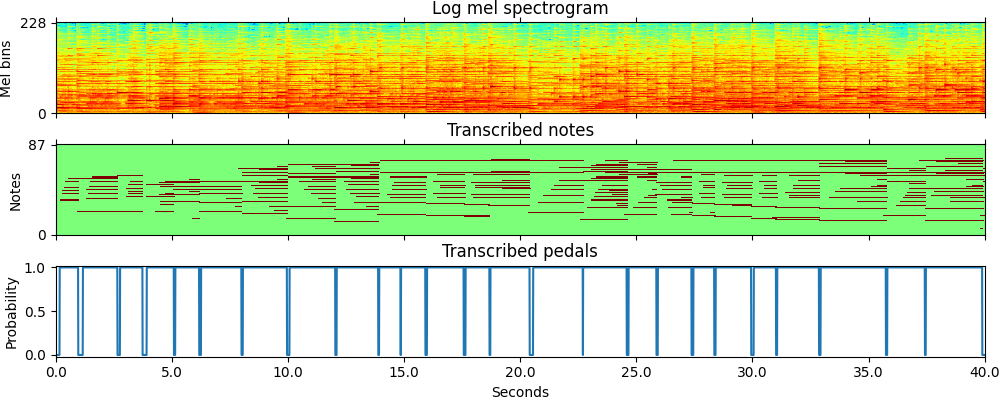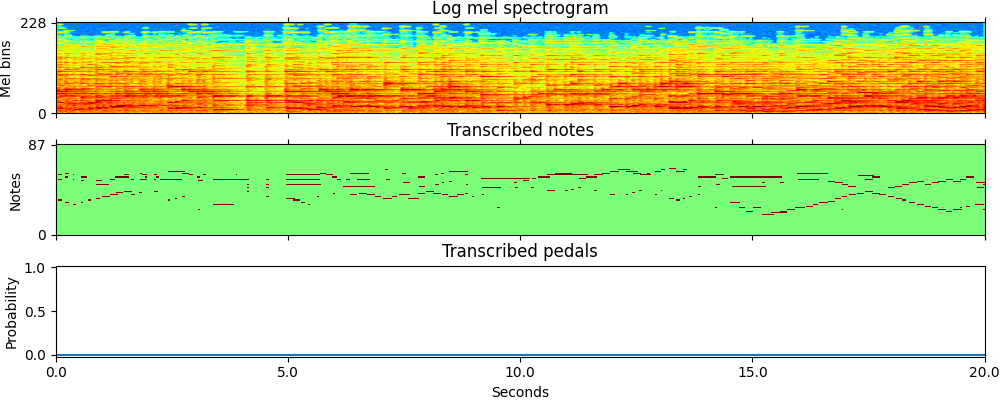Piano transcription
Piano transcription is the task of transcribing piano recordings into MIDI files. This repo is the PyTorch implementation of our proposed high-resolution piano transcription system [1].
Demos
Here is a demo of our piano transcription system: https://www.youtube.com/watch?v=5U-WL0QvKCg
Environments
This codebase is developed with Python 3.7 and PyTorch 1.4.0 (Should work with other versions, but not fully tested).
Install dependencies:
pip install -r requirements.txt
Piano transcription using pretrained model
The easiest way is to transcribe a new piano recording is to install the piano_transcription_inference package: https://github.com/qiuqiangkong/piano_transcription_inference with pip as follows:
pip install piano_transcription_inference
Then, execute the following commands to transcribe this audio.
from piano_transcription_inference import PianoTranscription, sample_rate, load_audio
# Load audio
(audio, _) = load_audio('resources/cut_liszt.mp3', sr=sample_rate, mono=True)
# Transcriptor
transcriptor = PianoTranscription(device='cuda') # 'cuda' | 'cpu'
# Transcribe and write out to MIDI file
transcribed_dict = transcriptor.transcribe(audio, 'cut_liszt.mid')
Train a piano transcription system from scratch
This section provides instructions if users would like to train a piano transcription system from scratch.
0. Prepare data
We use MAESTRO dataset V2.0.0 [1] to train the piano transcription system. MAESTRO consists of over 200 hours of virtuosic piano performances captured with fine alignment (~3 ms) between note labels and audio waveforms. MAESTRO dataset can be downloaded from https://magenta.tensorflow.org/datasets/maestro.
Statistics of MAESTRO V2.0.0 [ref]:
| Split | Performances | Duration (hours) | Size (GB) | Notes (millions) |
|---|---|---|---|---|
| Train | 967 | 161.3 | 97.7 | 5.73 |
| Validation | 137 | 19.4 | 11.8 | 0.64 |
| Test | 178 | 20.5 | 12.4 | 0.76 |
| Total | 1282 | 201.2 | 121.8 | 7.13 |
After downloading, the dataset looks like:
dataset_root ├── 2004 │ └── (264 files) ├── 2006 │ └── (230 files) ├── 2008 │ └── (294 files) ├── 2009 │ └── (250 files) ├── 2011 │ └── (326 files) ├── 2013 │ └── (254 files) ├── 2014 │ └── (210 files) ├── 2015 │ └── (258 files) ├── 2017 │ └── (280 files) ├── 2018 │ └── (198 files) ├── LICENSE ├── maestro-v2.0.0.csv ├── maestro-v2.0.0.json └── README
1. Train
Execute the commands line by line in runme.sh, including:
- Config dataset path and your workspace.
- Pack audio recordings to hdf5 files.
- Train piano note transcription system.
- Train piano pedal transcription system.
- Combine piano note and piano pedal transcription systems.
- Evaluate.
All training steps are described in runme.sh. It worth looking into runme.sh to see how the piano transcription system is trained. In total 29 GB GPU memoroy is required with a batch size of 12. Users may consider to reduce the batch size, or use multiple GPU cards to train this system.
Results
The training uses a single Tesla-V100-PCIE-32GB card. The system is trained for 300k iterations for one week. The training looks like:
Namespace(augmentation='none', batch_size=12, cuda=True, early_stop=300000, filename='main', learning_rate=0.0005, loss_type='regress_onset_offset_frame_velocity_bce', max_note_shift=0, mini_data=False, mode='train', model_type='Regress_onset_offset_frame_velocity_CRNN', reduce_iteration=10000, resume_iteration=0, workspace='.../workspaces/piano_transcription')
Using GPU.
train segments: 571589
Evaluate train segments: 571589
Evaluate validation segments: 68646
Evaluate test segments: 71959
------------------------------------
Iteration: 0
Train statistics: {'frame_ap': 0.0613, 'reg_onset_mae': 0.514, 'reg_offset_mae': 0.482, 'velocity_mae': 0.1362}
Validation statistics: {'frame_ap': 0.0605, 'reg_onset_mae': 0.5143, 'reg_offset_mae': 0.4819, 'velocity_mae': 0.133}
Test statistics: {'frame_ap': 0.0601, 'reg_onset_mae': 0.5139, 'reg_offset_mae': 0.4821, 'velocity_mae': 0.1283}
Dump statistics to .../workspaces/piano_transcription/statistics/main/Regress_onset_offset_frame_velocity_CRNN/loss_type=regress_onset_offset_frame_velocity_bce/augmentation=none/batch_size=12/statistics.pkl
Dump statistics to .../workspaces/piano_transcription/statistics/main/Regress_onset_offset_frame_velocity_CRNN/loss_type=regress_onset_offset_frame_velocity_bce/augmentation=none/batch_size=12/statistics_2020-04-28_00-22-33.pickle
Train time: 5.498 s, validate time: 92.863 s
Model saved to .../workspaces/piano_transcription/checkpoints/main/Regress_onset_offset_frame_velocity_CRNN/loss_type=regress_onset_offset_frame_velocity_bce/augmentation=none/batch_size=12/0_iterations.pth
------------------------------------
...
------------------------------------
Iteration: 300000
Train statistics: {'frame_ap': 0.9439, 'reg_onset_mae': 0.091, 'reg_offset_mae': 0.127, 'velocity_mae': 0.0241}
Validation statistics: {'frame_ap': 0.9245, 'reg_onset_mae': 0.0985, 'reg_offset_mae': 0.1327, 'velocity_mae': 0.0265}
Test statistics: {'frame_ap': 0.9285, 'reg_onset_mae': 0.097, 'reg_offset_mae': 0.1353, 'velocity_mae': 0.027}
Dump statistics to .../workspaces/piano_transcription/statistics/main/Regress_onset_offset_frame_velocity_CRNN/loss_type=regress_onset_offset_frame_velocity_bce/augmentation=none/batch_size=12/statistics.pkl
Dump statistics to .../workspaces/piano_transcription/statistics/main/Regress_onset_offset_frame_velocity_CRNN/loss_type=regress_onset_offset_frame_velocity_bce/augmentation=none/batch_size=12/statistics_2020-04-28_00-22-33.pickle
Train time: 8953.815 s, validate time: 93.683 s
Model saved to .../workspaces/piano_transcription/checkpoints/main/Regress_onset_offset_frame_velocity_CRNN/loss_type=regress_onset_offset_frame_velocity_bce/augmentation=none/batch_size=12/300000_iterations.pth
Visualization of piano transcription
Demo 1. Lang Lang: Franz Liszt - Love Dream (Liebestraum) [audio] [transcribed_midi]
Demo 2. Andras Schiff: J.S.Bach - French Suites [audio] [transcribed_midi]
FAQs
If users met running out of GPU memory error, then try to reduce batch size.
LICENSE
Apache 2.0
Applications
We have built a large-scale classical piano MIDI dataset using our piano transcription system. See https://github.com/bytedance/GiantMIDI-Piano for details.
Contact
Qiuqiang Kong, kongqiuqiang@bytedance.com
Cite
[1] Qiuqiang Kong, Bochen Li, Xuchen Song, Yuan Wan, and Yuxuan Wang. "High-resolution Piano Transcription with Pedals by Regressing Onsets and Offsets Times." arXiv preprint arXiv:2010.01815 (2020). [pdf]

